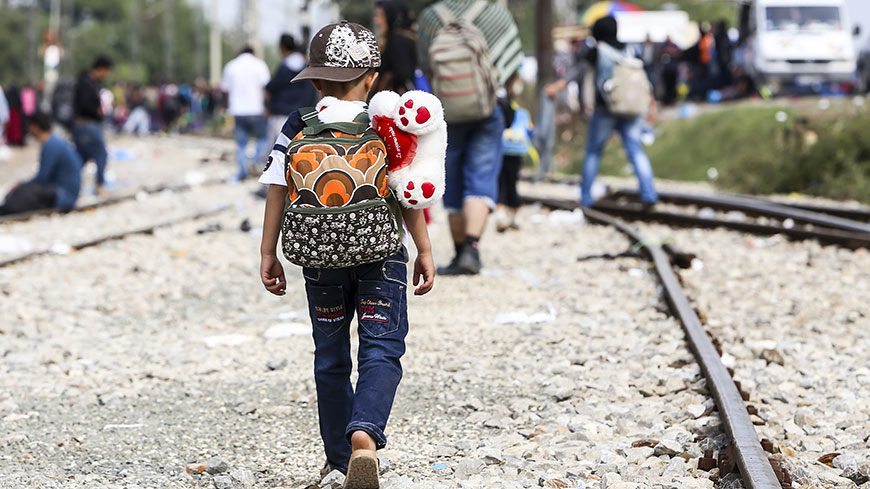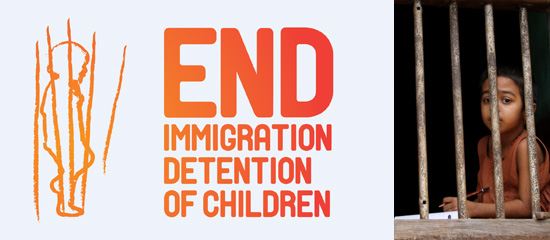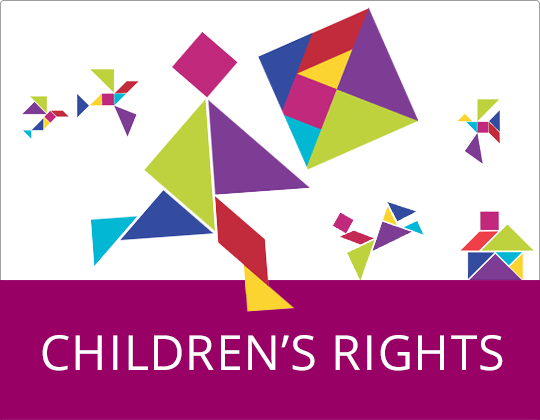Refugee and migrant children
Refugee and migrant children are first and foremost children. States must respect their rights, including their right to information, their right to be heard and to a life free from violence.
The Council of Europe aims to ensure that all refugee and migrant children can benefit from the protection measures set out in international and European legal instruments and enjoy the full realisation of their rights in compliance with the UN Convention on the Rights of the Child and the European Convention for Human Rights.
Protecting the rights of refugee and migrant children remains an ongoing challenge and a long-term commitment. Action in this area is guided by the Council of Europe Strategy for the Rights of the Child (2022-2027), whose implementation is overseen by the Steering Committee for the Rights of the Child (CDENF).
CDENF acts as a pan European platform for regular exchanges of knowledge, good practices and experiences to support the implementation of policy measures to protect unaccompanied and other children in the context of migration. Key policy areas addressed include:
- promoting good practices for the implementation of CM/Rec(2019)11 on effective guardianship for unaccompanied and separated children in the context of migration and its Explanatory Memorandum;
- addressing the implementation of policies aimed at ensuring sustainable and durable solutions and the effective integration of children affected by migration more generally, notably by reviewing the implementation of CM/Rec(2007)09 on life projects for unaccompanied migrant minors;
- supporting member states in the implementation of Recommendation CM/Rec(2022)22 on human rights principles and guidelines on age assessment in the context of migration and its Explanatory Memorandum.
In order to protect and promote the rights of children on the move, the Council of Europe has been guiding member states in taking a co-ordinated child rights-based approach to tackle this challenge through two consecutive actions plans coordinated by the Special Representative on Migration and Refugees, and implemented by different bodies and divisions within the Council of Europe: Action Plan on Protecting Vulnerable Persons in the Context of Migration and Asylum in Europe (2021-2025) and Action Plan on Protecting Refugee and Migrant Children in Europe (2017-2019). These policy documents aim at ensuring access to rights and child-friendly procedures, providing effective protection and enhancing the integration of children who would remain in Europe.
Numerous Council of Europe bodies monitor the situation of migrant children in Europe. Recognising the high risk of children affected by the refugee crisis being or becoming victims of sexual exploitation or abuse, the Lanzarote Committee decided to launch an urgent monitoring round and issued a series of recommendations on measures to be taken to improve or reinforce the protection of children affected by the refugee crisis against sexual abuse, and identified promising practices.

Child-friendly information for children in migration and life projects
Child-friendly information for children in migration and life projects
This project supports member States to implement their obligations to inform children in migration in a child friendly way about their rights and to provide access to rights through child-friendly procedures, in line with the principles set out by the Council of Europe Guidelines on Child-friendly Justice. This project aims also to increase States’ capacities to implement durable solutions for children who will remain in Europe through implementation of life projects for unaccompanied children.
See also:
- Video animation on age assessment for children in migration (2020), developed jointly by the Council of Europe and the European Union Agency for Asylum. Available in Arabic, Bambara, Dari, French, Moroccan Arabic, Pashto, Portuguese, Punjabi, Somali, Spanish, Tigrinya and Wolof
- Age assessment for children in migration - A guide for policy-makers (2019)
- Your rights in the age assessment procedure - Information for children in migration (2019)
- How to convey child-friendly information to children in migration: A Handbook for frontline professionals (2019)
- Promoting child-friendly approaches in the area of migration: standards, guidance and current practices (2019)
Download the Children’s Rights Division Tools and Publications

End Immigration Detention of Children Campaign
The Children’s Rights Division carried out work in co-operation with the Council of Europe’s Parliamentary Assembly as part of the End Immigration Detention of Children Campaign. This project was supported through a voluntary contribution from the Government of Switzerland.
As part of this campaign, the Children’s Rights Division:
- Elaborated a training guide on monitoring places where children are deprived of their liberty as a result of immigration procedures (EN - FR - AR).
- Elaborated a training programme for members of national parliaments and ombudspersons’ staff on monitoring places where children are deprived of their liberty as a result of immigration procedures.
- Identified examples of age assessment policies, procedures and practices respectful of children's rights to support the work of the former Ad hoc Committee for the Rights of the Child of the Council of Europe (CAHENF) on standards regarding age assessment.
This project aimed at further enhancing co-operation between parliaments, ombudspersons, competent government bodies and civil service in addressing problems relating to immigration detention of children.
Council of Europe Consultation Group on the Children of Ukraine launched
The Council of Europe Consultation Group on the Children of Ukraine (CGU) held its first meeting in Strasbourg on 30 November - 1 December 2023, bringing together over 85 participants (in person and online) to discuss ways to effectively protect the rights of millions of Ukrainian children...
International Migrants Day
Council of Europe publishes guidance on how to better protect children against sexual exploitation and abuse in crisis and emergency situations
Children’s lives are disrupted and seriously affected when forced to leave their homes, whilst on the move, internally displaced or once they have reached the host country. These circumstances make children particularly vulnerable to violence, sexual abuse and exploitation, including trafficking...
Age assessment in the context of migration: presumption of minority, exceptional use of medical examination, other standards set by new Recommendation
The Council of Europe Committee of Ministers has adopted today a new Recommendation to member States on human rights principles and guidelines on age assessment in the context of migration. Refugee and migrant children are among the most vulnerable and exposed persons on the move. Being unable to...
CoE/UNHCR roundtable in the Czech Republic: Effective protection of people fleeing Ukraine, in particular women and children in a vulnerable situation
Supporting the Czech authorities in strengthening the protection of people fleeing Ukraine, in particular women and children in a vulnarable situation, was the main topic of a roundtable discussion co-organised on 26 January 2023 by the Special Representative of the Secretary General of the...
Council of Europe checklist to protect children affected by refugee crisis from sexual abuse is now available in more languages
The Checklist prepared by the Lanzarote Committee’s Secretariat on the basis of the Committee’s urgent monitoring findings on “Protecting children affected by the refugee crisis from sexual exploitation and sexual abuse” is now available in Ukrainian and Romanian (in addition to English and...



